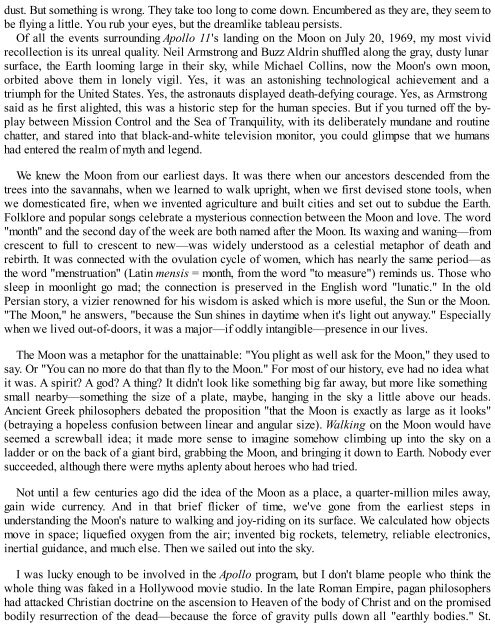Pale Blue Dot ( PDFDrive.com ) (1)
Create successful ePaper yourself
Turn your PDF publications into a flip-book with our unique Google optimized e-Paper software.
dust. But something is wrong. They take too long to <strong>com</strong>e down. Encumbered as they are, they seem to<br />
be flying a little. You rub your eyes, but the dreamlike tableau persists.<br />
Of all the events surrounding Apollo 11's landing on the Moon on July 20, 1969, my most vivid<br />
recollection is its unreal quality. Neil Armstrong and Buzz Aldrin shuffled along the gray, dusty lunar<br />
surface, the Earth looming large in their sky, while Michael Collins, now the Moon's own moon,<br />
orbited above them in lonely vigil. Yes, it was an astonishing technological achievement and a<br />
triumph for the United States. Yes, the astronauts displayed death-defying courage. Yes, as Armstrong<br />
said as he first alighted, this was a historic step for the human species. But if you turned off the byplay<br />
between Mission Control and the Sea of Tranquility, with its deliberately mundane and routine<br />
chatter, and stared into that black-and-white television monitor, you could glimpse that we humans<br />
had entered the realm of myth and legend.<br />
We knew the Moon from our earliest days. It was there when our ancestors descended from the<br />
trees into the savannahs, when we learned to walk upright, when we first devised stone tools, when<br />
we domesticated fire, when we invented agriculture and built cities and set out to subdue the Earth.<br />
Folklore and popular songs celebrate a mysterious connection between the Moon and love. The word<br />
"month" and the second day of the week are both named after the Moon. Its waxing and waning—from<br />
crescent to full to crescent to new—was widely understood as a celestial metaphor of death and<br />
rebirth. It was connected with the ovulation cycle of women, which has nearly the same period—as<br />
the word "menstruation" (Latin mensis = month, from the word "to measure") reminds us. Those who<br />
sleep in moonlight go mad; the connection is preserved in the English word "lunatic." In the old<br />
Persian story, a vizier renowned for his wisdom is asked which is more useful, the Sun or the Moon.<br />
"The Moon," he answers, "because the Sun shines in daytime when it's light out anyway." Especially<br />
when we lived out-of-doors, it was a major—if oddly intangible—presence in our lives.<br />
The Moon was a metaphor for the unattainable: "You plight as well ask for the Moon," they used to<br />
say. Or "You can no more do that than fly to the Moon." For most of our history, eve had no idea what<br />
it was. A spirit? A god? A thing? It didn't look like something big far away, but more like something<br />
small nearby—something the size of a plate, maybe, hanging in the sky a little above our heads.<br />
Ancient Greek philosophers debated the proposition "that the Moon is exactly as large as it looks"<br />
(betraying a hopeless confusion between linear and angular size). Walking on the Moon would have<br />
seemed a screwball idea; it made more sense to imagine somehow climbing up into the sky on a<br />
ladder or on the back of a giant bird, grabbing the Moon, and bringing it down to Earth. Nobody ever<br />
succeeded, although there were myths aplenty about heroes who had tried.<br />
Not until a few centuries ago did the idea of the Moon as a place, a quarter-million miles away,<br />
gain wide currency. And in that brief flicker of time, we've gone from the earliest steps in<br />
understanding the Moon's nature to walking and joy-riding on its surface. We calculated how objects<br />
move in space; liquefied oxygen from the air; invented big rockets, telemetry, reliable electronics,<br />
inertial guidance, and much else. Then we sailed out into the sky.<br />
I was lucky enough to be involved in the Apollo program, but I don't blame people who think the<br />
whole thing was faked in a Hollywood movie studio. In the late Roman Empire, pagan philosophers<br />
had attacked Christian doctrine on the ascension to Heaven of the body of Christ and on the promised<br />
bodily resurrection of the dead—because the force of gravity pulls down all "earthly bodies." St.


